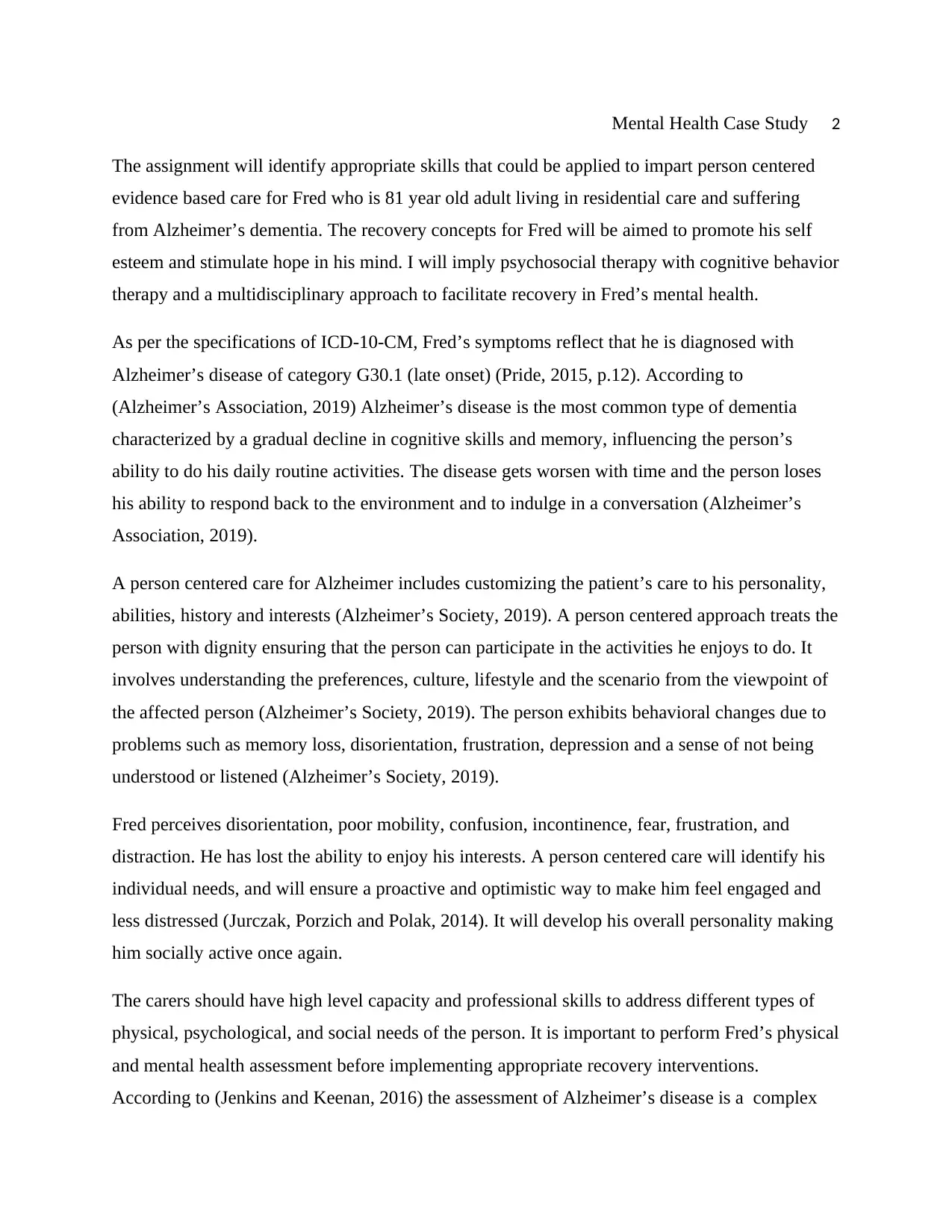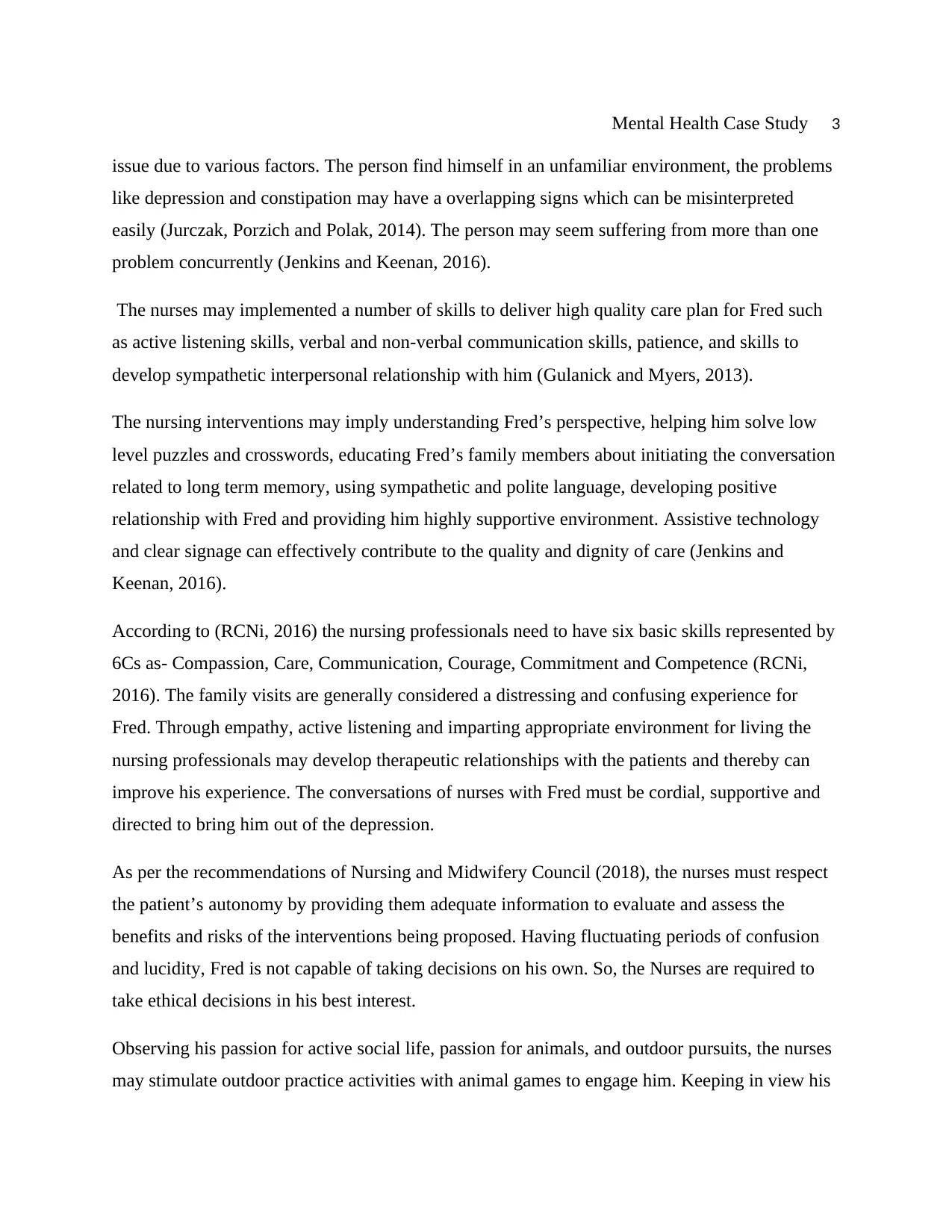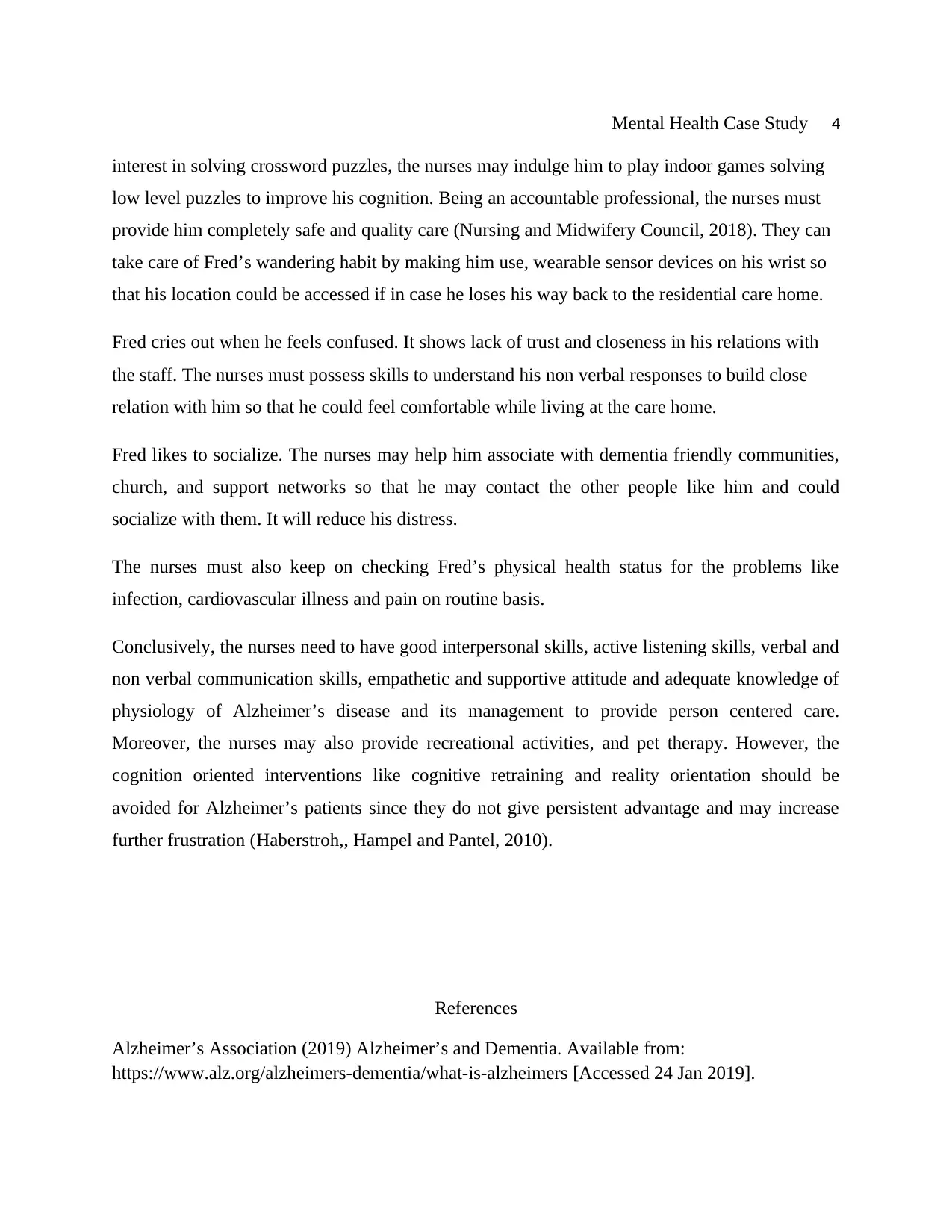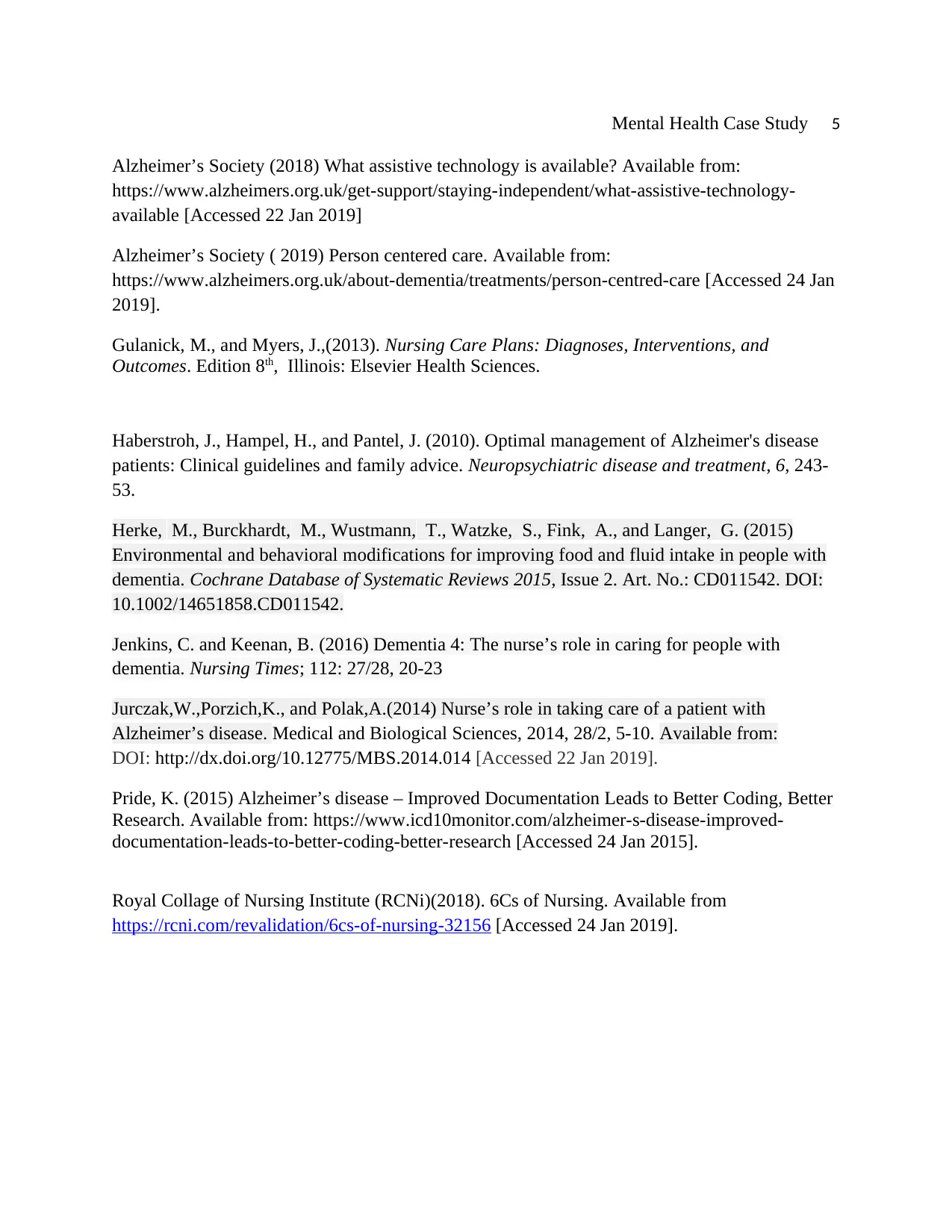University Case Study: Person-Centered Care for Alzheimer's Patients
VerifiedAdded on 2023/04/23
|5
|1561
|386
Case Study
AI Summary
This case study focuses on Fred, an 81-year-old resident with Alzheimer's dementia in a residential care setting. It emphasizes the application of person-centered, evidence-based care to promote self-esteem and hope, utilizing psychosocial and cognitive behavioral therapies. The case study, referencing ICD-10-CM, discusses the disease's impact on cognitive skills, memory, and daily activities. It highlights the importance of individualized care tailored to the patient's history, preferences, and abilities, addressing behavioral changes such as disorientation and frustration. The study details necessary nursing skills, including active listening, communication, and empathy, along with interventions like puzzles, family education, and assistive technologies. It also references the 6Cs of nursing (Compassion, Care, Communication, Courage, Commitment, and Competence) and ethical considerations related to patient autonomy. The case study recommends activities like pet therapy and social engagement, while cautioning against cognitive retraining. The goal is to provide safe, quality care that enhances the patient's quality of life.

Mental Health Case Study
Case Scenario- Fred
Student Name:
Submitted to:
University:
Case Scenario- Fred
Student Name:
Submitted to:
University:
Paraphrase This Document
Need a fresh take? Get an instant paraphrase of this document with our AI Paraphraser

Mental Health Case Study 2
The assignment will identify appropriate skills that could be applied to impart person centered
evidence based care for Fred who is 81 year old adult living in residential care and suffering
from Alzheimer’s dementia. The recovery concepts for Fred will be aimed to promote his self
esteem and stimulate hope in his mind. I will imply psychosocial therapy with cognitive behavior
therapy and a multidisciplinary approach to facilitate recovery in Fred’s mental health.
As per the specifications of ICD-10-CM, Fred’s symptoms reflect that he is diagnosed with
Alzheimer’s disease of category G30.1 (late onset) (Pride, 2015, p.12). According to
(Alzheimer’s Association, 2019) Alzheimer’s disease is the most common type of dementia
characterized by a gradual decline in cognitive skills and memory, influencing the person’s
ability to do his daily routine activities. The disease gets worsen with time and the person loses
his ability to respond back to the environment and to indulge in a conversation (Alzheimer’s
Association, 2019).
A person centered care for Alzheimer includes customizing the patient’s care to his personality,
abilities, history and interests (Alzheimer’s Society, 2019). A person centered approach treats the
person with dignity ensuring that the person can participate in the activities he enjoys to do. It
involves understanding the preferences, culture, lifestyle and the scenario from the viewpoint of
the affected person (Alzheimer’s Society, 2019). The person exhibits behavioral changes due to
problems such as memory loss, disorientation, frustration, depression and a sense of not being
understood or listened (Alzheimer’s Society, 2019).
Fred perceives disorientation, poor mobility, confusion, incontinence, fear, frustration, and
distraction. He has lost the ability to enjoy his interests. A person centered care will identify his
individual needs, and will ensure a proactive and optimistic way to make him feel engaged and
less distressed (Jurczak, Porzich and Polak, 2014). It will develop his overall personality making
him socially active once again.
The carers should have high level capacity and professional skills to address different types of
physical, psychological, and social needs of the person. It is important to perform Fred’s physical
and mental health assessment before implementing appropriate recovery interventions.
According to (Jenkins and Keenan, 2016) the assessment of Alzheimer’s disease is a complex
The assignment will identify appropriate skills that could be applied to impart person centered
evidence based care for Fred who is 81 year old adult living in residential care and suffering
from Alzheimer’s dementia. The recovery concepts for Fred will be aimed to promote his self
esteem and stimulate hope in his mind. I will imply psychosocial therapy with cognitive behavior
therapy and a multidisciplinary approach to facilitate recovery in Fred’s mental health.
As per the specifications of ICD-10-CM, Fred’s symptoms reflect that he is diagnosed with
Alzheimer’s disease of category G30.1 (late onset) (Pride, 2015, p.12). According to
(Alzheimer’s Association, 2019) Alzheimer’s disease is the most common type of dementia
characterized by a gradual decline in cognitive skills and memory, influencing the person’s
ability to do his daily routine activities. The disease gets worsen with time and the person loses
his ability to respond back to the environment and to indulge in a conversation (Alzheimer’s
Association, 2019).
A person centered care for Alzheimer includes customizing the patient’s care to his personality,
abilities, history and interests (Alzheimer’s Society, 2019). A person centered approach treats the
person with dignity ensuring that the person can participate in the activities he enjoys to do. It
involves understanding the preferences, culture, lifestyle and the scenario from the viewpoint of
the affected person (Alzheimer’s Society, 2019). The person exhibits behavioral changes due to
problems such as memory loss, disorientation, frustration, depression and a sense of not being
understood or listened (Alzheimer’s Society, 2019).
Fred perceives disorientation, poor mobility, confusion, incontinence, fear, frustration, and
distraction. He has lost the ability to enjoy his interests. A person centered care will identify his
individual needs, and will ensure a proactive and optimistic way to make him feel engaged and
less distressed (Jurczak, Porzich and Polak, 2014). It will develop his overall personality making
him socially active once again.
The carers should have high level capacity and professional skills to address different types of
physical, psychological, and social needs of the person. It is important to perform Fred’s physical
and mental health assessment before implementing appropriate recovery interventions.
According to (Jenkins and Keenan, 2016) the assessment of Alzheimer’s disease is a complex

Mental Health Case Study 3
issue due to various factors. The person find himself in an unfamiliar environment, the problems
like depression and constipation may have a overlapping signs which can be misinterpreted
easily (Jurczak, Porzich and Polak, 2014). The person may seem suffering from more than one
problem concurrently (Jenkins and Keenan, 2016).
The nurses may implemented a number of skills to deliver high quality care plan for Fred such
as active listening skills, verbal and non-verbal communication skills, patience, and skills to
develop sympathetic interpersonal relationship with him (Gulanick and Myers, 2013).
The nursing interventions may imply understanding Fred’s perspective, helping him solve low
level puzzles and crosswords, educating Fred’s family members about initiating the conversation
related to long term memory, using sympathetic and polite language, developing positive
relationship with Fred and providing him highly supportive environment. Assistive technology
and clear signage can effectively contribute to the quality and dignity of care (Jenkins and
Keenan, 2016).
According to (RCNi, 2016) the nursing professionals need to have six basic skills represented by
6Cs as- Compassion, Care, Communication, Courage, Commitment and Competence (RCNi,
2016). The family visits are generally considered a distressing and confusing experience for
Fred. Through empathy, active listening and imparting appropriate environment for living the
nursing professionals may develop therapeutic relationships with the patients and thereby can
improve his experience. The conversations of nurses with Fred must be cordial, supportive and
directed to bring him out of the depression.
As per the recommendations of Nursing and Midwifery Council (2018), the nurses must respect
the patient’s autonomy by providing them adequate information to evaluate and assess the
benefits and risks of the interventions being proposed. Having fluctuating periods of confusion
and lucidity, Fred is not capable of taking decisions on his own. So, the Nurses are required to
take ethical decisions in his best interest.
Observing his passion for active social life, passion for animals, and outdoor pursuits, the nurses
may stimulate outdoor practice activities with animal games to engage him. Keeping in view his
issue due to various factors. The person find himself in an unfamiliar environment, the problems
like depression and constipation may have a overlapping signs which can be misinterpreted
easily (Jurczak, Porzich and Polak, 2014). The person may seem suffering from more than one
problem concurrently (Jenkins and Keenan, 2016).
The nurses may implemented a number of skills to deliver high quality care plan for Fred such
as active listening skills, verbal and non-verbal communication skills, patience, and skills to
develop sympathetic interpersonal relationship with him (Gulanick and Myers, 2013).
The nursing interventions may imply understanding Fred’s perspective, helping him solve low
level puzzles and crosswords, educating Fred’s family members about initiating the conversation
related to long term memory, using sympathetic and polite language, developing positive
relationship with Fred and providing him highly supportive environment. Assistive technology
and clear signage can effectively contribute to the quality and dignity of care (Jenkins and
Keenan, 2016).
According to (RCNi, 2016) the nursing professionals need to have six basic skills represented by
6Cs as- Compassion, Care, Communication, Courage, Commitment and Competence (RCNi,
2016). The family visits are generally considered a distressing and confusing experience for
Fred. Through empathy, active listening and imparting appropriate environment for living the
nursing professionals may develop therapeutic relationships with the patients and thereby can
improve his experience. The conversations of nurses with Fred must be cordial, supportive and
directed to bring him out of the depression.
As per the recommendations of Nursing and Midwifery Council (2018), the nurses must respect
the patient’s autonomy by providing them adequate information to evaluate and assess the
benefits and risks of the interventions being proposed. Having fluctuating periods of confusion
and lucidity, Fred is not capable of taking decisions on his own. So, the Nurses are required to
take ethical decisions in his best interest.
Observing his passion for active social life, passion for animals, and outdoor pursuits, the nurses
may stimulate outdoor practice activities with animal games to engage him. Keeping in view his
⊘ This is a preview!⊘
Do you want full access?
Subscribe today to unlock all pages.

Trusted by 1+ million students worldwide

Mental Health Case Study 4
interest in solving crossword puzzles, the nurses may indulge him to play indoor games solving
low level puzzles to improve his cognition. Being an accountable professional, the nurses must
provide him completely safe and quality care (Nursing and Midwifery Council, 2018). They can
take care of Fred’s wandering habit by making him use, wearable sensor devices on his wrist so
that his location could be accessed if in case he loses his way back to the residential care home.
Fred cries out when he feels confused. It shows lack of trust and closeness in his relations with
the staff. The nurses must possess skills to understand his non verbal responses to build close
relation with him so that he could feel comfortable while living at the care home.
Fred likes to socialize. The nurses may help him associate with dementia friendly communities,
church, and support networks so that he may contact the other people like him and could
socialize with them. It will reduce his distress.
The nurses must also keep on checking Fred’s physical health status for the problems like
infection, cardiovascular illness and pain on routine basis.
Conclusively, the nurses need to have good interpersonal skills, active listening skills, verbal and
non verbal communication skills, empathetic and supportive attitude and adequate knowledge of
physiology of Alzheimer’s disease and its management to provide person centered care.
Moreover, the nurses may also provide recreational activities, and pet therapy. However, the
cognition oriented interventions like cognitive retraining and reality orientation should be
avoided for Alzheimer’s patients since they do not give persistent advantage and may increase
further frustration (Haberstroh,, Hampel and Pantel, 2010).
References
Alzheimer’s Association (2019) Alzheimer’s and Dementia. Available from:
https://www.alz.org/alzheimers-dementia/what-is-alzheimers [Accessed 24 Jan 2019].
interest in solving crossword puzzles, the nurses may indulge him to play indoor games solving
low level puzzles to improve his cognition. Being an accountable professional, the nurses must
provide him completely safe and quality care (Nursing and Midwifery Council, 2018). They can
take care of Fred’s wandering habit by making him use, wearable sensor devices on his wrist so
that his location could be accessed if in case he loses his way back to the residential care home.
Fred cries out when he feels confused. It shows lack of trust and closeness in his relations with
the staff. The nurses must possess skills to understand his non verbal responses to build close
relation with him so that he could feel comfortable while living at the care home.
Fred likes to socialize. The nurses may help him associate with dementia friendly communities,
church, and support networks so that he may contact the other people like him and could
socialize with them. It will reduce his distress.
The nurses must also keep on checking Fred’s physical health status for the problems like
infection, cardiovascular illness and pain on routine basis.
Conclusively, the nurses need to have good interpersonal skills, active listening skills, verbal and
non verbal communication skills, empathetic and supportive attitude and adequate knowledge of
physiology of Alzheimer’s disease and its management to provide person centered care.
Moreover, the nurses may also provide recreational activities, and pet therapy. However, the
cognition oriented interventions like cognitive retraining and reality orientation should be
avoided for Alzheimer’s patients since they do not give persistent advantage and may increase
further frustration (Haberstroh,, Hampel and Pantel, 2010).
References
Alzheimer’s Association (2019) Alzheimer’s and Dementia. Available from:
https://www.alz.org/alzheimers-dementia/what-is-alzheimers [Accessed 24 Jan 2019].
Paraphrase This Document
Need a fresh take? Get an instant paraphrase of this document with our AI Paraphraser

Mental Health Case Study 5
Alzheimer’s Society (2018) What assistive technology is available? Available from:
https://www.alzheimers.org.uk/get-support/staying-independent/what-assistive-technology-
available [Accessed 22 Jan 2019]
Alzheimer’s Society ( 2019) Person centered care. Available from:
https://www.alzheimers.org.uk/about-dementia/treatments/person-centred-care [Accessed 24 Jan
2019].
Gulanick, M., and Myers, J.,(2013). Nursing Care Plans: Diagnoses, Interventions, and
Outcomes. Edition 8th, Illinois: Elsevier Health Sciences.
Haberstroh, J., Hampel, H., and Pantel, J. (2010). Optimal management of Alzheimer's disease
patients: Clinical guidelines and family advice. Neuropsychiatric disease and treatment, 6, 243-
53.
Herke, M., Burckhardt, M., Wustmann, T., Watzke, S., Fink, A., and Langer, G. (2015)
Environmental and behavioral modifications for improving food and fluid intake in people with
dementia. Cochrane Database of Systematic Reviews 2015, Issue 2. Art. No.: CD011542. DOI:
10.1002/14651858.CD011542.
Jenkins, C. and Keenan, B. (2016) Dementia 4: The nurse’s role in caring for people with
dementia. Nursing Times; 112: 27/28, 20-23
Jurczak,W.,Porzich,K., and Polak,A.(2014) Nurse’s role in taking care of a patient with
Alzheimer’s disease. Medical and Biological Sciences, 2014, 28/2, 5-10. Available from:
DOI: http://dx.doi.org/10.12775/MBS.2014.014 [Accessed 22 Jan 2019].
Pride, K. (2015) Alzheimer’s disease – Improved Documentation Leads to Better Coding, Better
Research. Available from: https://www.icd10monitor.com/alzheimer-s-disease-improved-
documentation-leads-to-better-coding-better-research [Accessed 24 Jan 2015].
Royal Collage of Nursing Institute (RCNi)(2018). 6Cs of Nursing. Available from
https://rcni.com/revalidation/6cs-of-nursing-32156 [Accessed 24 Jan 2019].
Alzheimer’s Society (2018) What assistive technology is available? Available from:
https://www.alzheimers.org.uk/get-support/staying-independent/what-assistive-technology-
available [Accessed 22 Jan 2019]
Alzheimer’s Society ( 2019) Person centered care. Available from:
https://www.alzheimers.org.uk/about-dementia/treatments/person-centred-care [Accessed 24 Jan
2019].
Gulanick, M., and Myers, J.,(2013). Nursing Care Plans: Diagnoses, Interventions, and
Outcomes. Edition 8th, Illinois: Elsevier Health Sciences.
Haberstroh, J., Hampel, H., and Pantel, J. (2010). Optimal management of Alzheimer's disease
patients: Clinical guidelines and family advice. Neuropsychiatric disease and treatment, 6, 243-
53.
Herke, M., Burckhardt, M., Wustmann, T., Watzke, S., Fink, A., and Langer, G. (2015)
Environmental and behavioral modifications for improving food and fluid intake in people with
dementia. Cochrane Database of Systematic Reviews 2015, Issue 2. Art. No.: CD011542. DOI:
10.1002/14651858.CD011542.
Jenkins, C. and Keenan, B. (2016) Dementia 4: The nurse’s role in caring for people with
dementia. Nursing Times; 112: 27/28, 20-23
Jurczak,W.,Porzich,K., and Polak,A.(2014) Nurse’s role in taking care of a patient with
Alzheimer’s disease. Medical and Biological Sciences, 2014, 28/2, 5-10. Available from:
DOI: http://dx.doi.org/10.12775/MBS.2014.014 [Accessed 22 Jan 2019].
Pride, K. (2015) Alzheimer’s disease – Improved Documentation Leads to Better Coding, Better
Research. Available from: https://www.icd10monitor.com/alzheimer-s-disease-improved-
documentation-leads-to-better-coding-better-research [Accessed 24 Jan 2015].
Royal Collage of Nursing Institute (RCNi)(2018). 6Cs of Nursing. Available from
https://rcni.com/revalidation/6cs-of-nursing-32156 [Accessed 24 Jan 2019].
1 out of 5
Related Documents
Your All-in-One AI-Powered Toolkit for Academic Success.
+13062052269
info@desklib.com
Available 24*7 on WhatsApp / Email
![[object Object]](/_next/static/media/star-bottom.7253800d.svg)
Unlock your academic potential
Copyright © 2020–2026 A2Z Services. All Rights Reserved. Developed and managed by ZUCOL.





